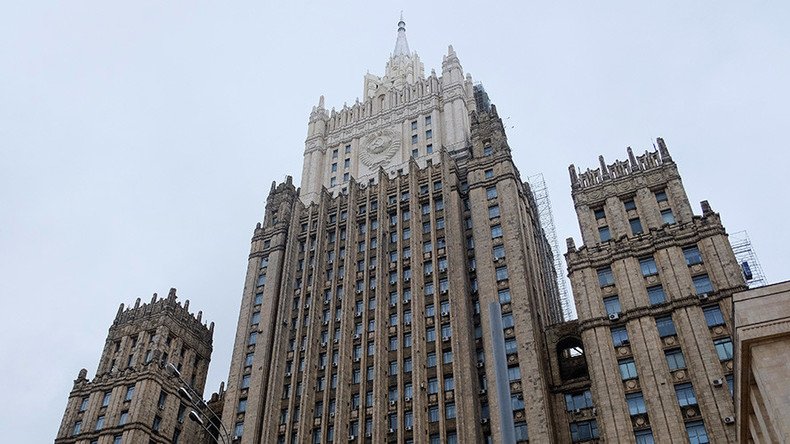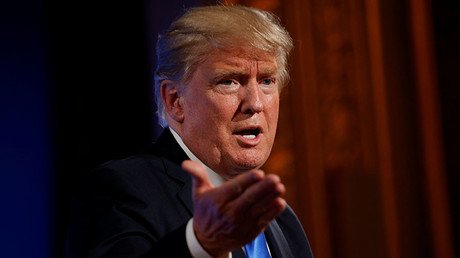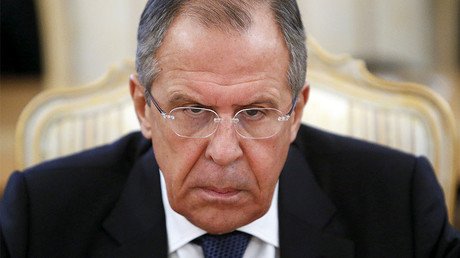VP Pence's Balkan remarks show Washington sliding into ‘primitive Cold War clichés’ – Moscow

The Russian foreign ministry says the US is “sliding deeper” into a Cold War paradigm that is “totally detached from reality,” while warning Washington to “stop demonizing Russia and it foreign policy."
“On August 2, the US Vice President [Mike] Pence once again made a series of anti-Russian statements and intimidated the leaders of the Balkan countries with the mythical ‘Russian threat,” the ministry said, adding, that the US official went as far as to “accuse [Russia] of attempts to forcefully redraw borders in the region.”
“Washington slides ever deeper into the primitive ideology-driven Cold War clichés that are totally detached from reality," the ministry said. It went on to sharply criticize the US for “enforcing an openly destructive choice between the West and Russia on the Balkan countries.”
Such policies “inevitably leads to the increased tension on the European continent as well as destabilizes the situation in the region and in some particular states,” the statement added.
The Russian foreign ministry also said the US exploits the security agenda and anti-Russian hysteria to pursue its own selfish interests. The US particularly enforces the idea that joining NATO is the only option for the Balkan states and forces them to take part in the “projects based on unfair competition and defying any economic logic.”
The ministry particularly drew attention to the fact that Washington “pushed” Montenegro into joining NATO against the will of the majority of its people. The Balkan nation joined the Alliance on June 5, after Montenegrin MPs voted 46-0 to become the 29th member of the military alliance in April.
However, 35 opposition lawmakers – almost half of the country’s MPs – boycotted the parliamentary session, while hundreds of protesters gathered outside the parliament building before the vote to express their strong opposition to accession.
The ministry called on the US to “stop demonizing Russia and it foreign policy, which is based on respect to [Russia’s] partners and readiness for cooperation.”
Moscow's heated reaction was triggered by Pence's remarks as he addressed Balkan leaders at a summit in Montenegro Wednesday.
“As you well know, Russia continues to seek to redraw international borders by force and here in the Western Balkans, Russia has worked to destabilize the region, undermining your democracies and divide you from each other and from the rest of Europe,” he said as cited by AP.
The US vice president even accused Moscow of masterminding the failed coup in Montenegro by saying that “Russia's intentions were laid bare when Moscow-backed agents sought to disrupt Montenegro's elections, attack your parliament and even attempt to assassinate your prime minister to dissuade the Montenegrin people from entering the NATO alliance."
In October 2016, Montenegrin police arrested 20 Serbs – one of them a retired police commander – during the country's parliamentary elections, and accused them of planning armed attacks against state institutions.
In November, the Montenegrin special prosecutor for organized crime, Milivoje Katnic accused a "powerful organization" of attempting to assassinate Prime Minister Milo Djukanovic, adding that the group consisted of 50 people from Montenegro, Serbia and Russia. However, he added that there was no data directly linking Moscow to the planned attack.
Ahead of the elections, Djukanovic claimed Moscow was financing the opposition to stop the country joining NATO. The opposition parties – many of them pro-NATO – denied the allegations. Some even suggested that the entire plot was fabricated to ensure Djukanovic a tighter grip on power.
In February, more than four months after the incident, the British newspaper the Telegraph published a report which claimed Moscow had conspired to overthrow Montenegro’s government. That report also provoked an angry reaction in Moscow with the Russia's Foreign Minister Sergey Lavrov dismissing the allegations as “absurd” and “unfounded.”














